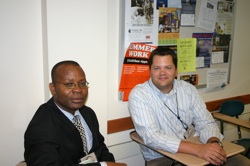 Populations are growing, diets are becoming healthier, land and water rights are being cracked down upon and the consumption of food is doubling as the years progress forward becomes, “The need for and acceptance of biotechnology in feeding a hungry world.”
Populations are growing, diets are becoming healthier, land and water rights are being cracked down upon and the consumption of food is doubling as the years progress forward becomes, “The need for and acceptance of biotechnology in feeding a hungry world.”
Kevin Eblen, of the Monsanto Company, set the stage for his presentation Monday with a video that talks about the commitment of sustainability. Sustainability is defined as development that meets the needs of the present with out compromising the ability of future generations.
People’s lives are changing daily, with 70 percent of water being used by people and farmers and trying to develop better seeds by 2030. Things are going to have to change in the present to be sustainable for the future. Monsanto Company is trying its best to keep up with these demands of better seeds through biotechnology.
Monsanto as a company is trying to increase cotton yields, with better seeds, almost doubling production by 2030. On average per year, the company invests $1 billion to breeding and harvesting techniques, agronomic practices and biotechnology. In funding these techniques, farmers can reap the benefits of having higher yield and more money to give back to the community. On a global level the “US is expanding corn yields at four times the rate of the European Union.” Everything is the same in the European Union, except for biotechnology. Biotechnology is the way to go for a better yield, but in the future, conserving more is going to be of great importance.
Conservation is a key issue with regard to new farming techniques. In 1995, Monsanto created the first weed and insect free corn. The next is a climate resistant corn. People question these new corn seeds that could change planting techniques. Within this new seed corn, water consumption will decline and land can be used for other purposes for the increasing population. If the farmer stays with biotechnology corn, the added net income will be increased by $ 33.8 billion.
Farmers and residents alike are going to have to partner up to think about the benefits of the future and understand that change is necessary for the survival of future generations.
Normal, Ill. is only the second U.S. city to host this event in the Congress’ 38-year history. IFMA runs from July19-24.


